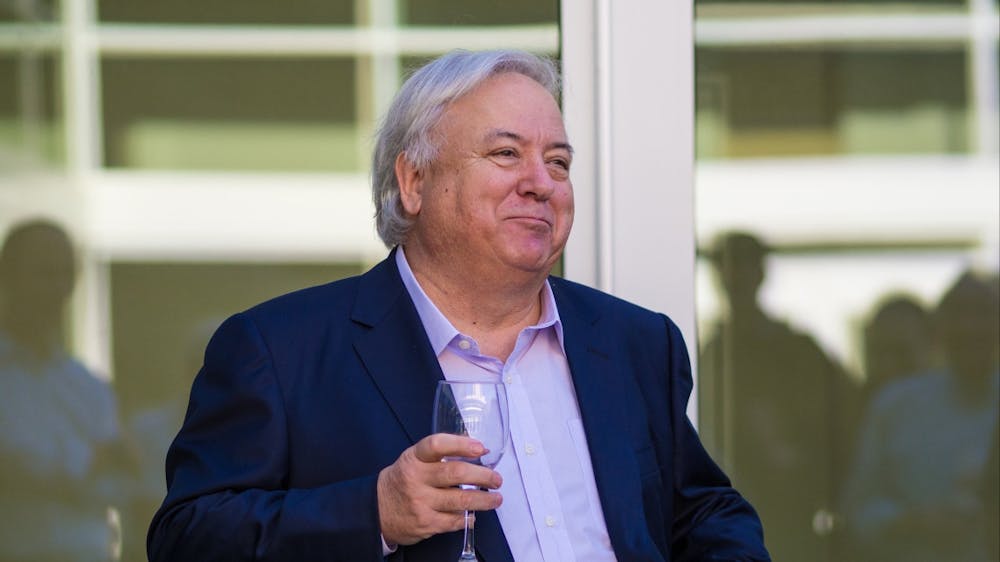Michael Ward, professor emeritus of political science, died on July 9 at age 72 on July 9 after a long fight against prostate cancer. He is remembered for his profound influence on colleagues, mentees and students, as well as his application of social network analysis to political science.
Prior to his work at Duke, Ward taught at Northwestern University, the University of Colorado, Pierre Mendès-France University and the University of Washington. He also founded Predictive Heuristics, a consulting firm focused on creating predictive models that allow enterprises to “gauge the global political risk environment.”
Ward published 12 books and over 100 articles during his career, advancing the understanding of international conflict, geopolitics, trade and many other subfields of political science.
Professor of Political Science Kyle Beardsley described Ward as “a pioneer in harnessing the power of prediction in international politics.”
“Mike was using theories of social network analysis in political science well before almost anyone else was. And also he was ahead of his time in using big data, really rich event-level data, to help us predict and forecast things like international crises,” Beardsley said.
Ward was also known for being unafraid to challenge existing conventions, allowing him to produce tremendous impact on his field.
“Mike was very unusual in that he did excellent work but in a way that I think we'll still be thinking about 20 years from now because he was not only helping us find new knowledge but challenging the way we do research,” said Jacob Montgomery, M.A. Statistical Science ‘09, Ph.D. ‘09 and ‘11.
Former student Cassy Dorff, M.A. Political Science '13, Ph.D. ‘15, valued how Ward advocated for underrepresented scholars in conflict studies and highly quantitative subfields of political science.
“I really appreciate that I had this very senior man as this mentor who didn’t just pretend that [underrepresentation] wasn’t a problem, and he didn’t pretend that [underrepresentation] was not going to be a part of my career because it is,” Dorff said. “He didn’t just throw up his arms and say ‘Okay, well this is all terrible so let’s just leave or let’s just not deal with it.’ He really tried to be a part of the changes that he wanted to see in the academy.”
In addition to Ward’s boldness, Beardsley admired Ward’s ability to be “skeptical and challenging in everything and yet warm and loving and graceful.”
Ward’s former student Howard Liu, M.A. Political Science ‘15 and Ph.D. ‘19, appreciated how these qualities translated into his mentorship.
“He just wanted to push ourselves to perform better academically because he knows that we can do that," Liu said. “When I was young, it was a lot of pressure for me, but retrospectively, I appreciate what he was doing because the pressure was giving me more incentive and motivation to do better.”
Liu vividly remembers their first conversation and how meaningful Ward’s encouragement was to him.
“[Ward] said in an email, ‘Hey lad, … I think you have a lot of potential and I just wanted to let you know that you will do great work after you decide to put in more hard work.”
Some of Dorff’s earliest memories with Ward highlight how encouraging he was as a mentor, Dorff noted.
“The first time I went to conferences with Mike, he always made sure to introduce me to colleagues, both colleagues that he knew well but also colleagues and other scholars in the field who maybe he didn’t know as well but thought I would benefit from getting a chance to interact with,” Dorff said.
In the lab, Dorff also found Ward to be supportive in how he made sure to celebrate every win and learn from losses.
“If someone got a publication or if the team got a publication, he would take us to dinner or he might buy some pastries for that lab meeting that morning, and I can’t eat pastries—I have celiac disease—so he would always make sure he found something that I could eat,” Dorff said.
Another one of Ward’s former students Shahryar Minhas, M.A. Computational Economics ‘15 and Ph.D. ‘16, also admired Ward’s caring nature. Minhas recalled how supportive Ward was when he was on the job market.
“He was always there to chat. He was always there to help. He was always there to let you know that like ‘Hey, even if things don't work out this first time, I'll be here. We'll set you up with a postdoc. You can come work in my consulting company,’” Minhas said. “He always made you feel appreciated and valued, and he cared a lot about everyone.”
In addition to his caring nature, Dorff found Ward’s large impact in various fields to be most memorable.
“One of the beauties of Mike’s life and one of the real gifts of his life is that he’s never going to be remembered for just one thing,” Dorff said. “He’s always going to be remembered for a multitude of things: for complexity, for generosity, for his wit, for his sharp mind, for pushing the field forward, for not accepting the status quo anywhere. And I think that’s something to really aspire to.”
Near the end of his life, Ward hoped that his body could help move cancer research forward. A campaign has been set up in his memory where donations will further his oncologist’s research on prostate cancer.
Ward is survived by his wife Sandra, his brother Dennis and his son Chris.
Get The Chronicle straight to your inbox
Signup for our weekly newsletter. Cancel at any time.

Ayra Charania is a Trinity junior and a senior editor of The Chronicle's 118th volume.

